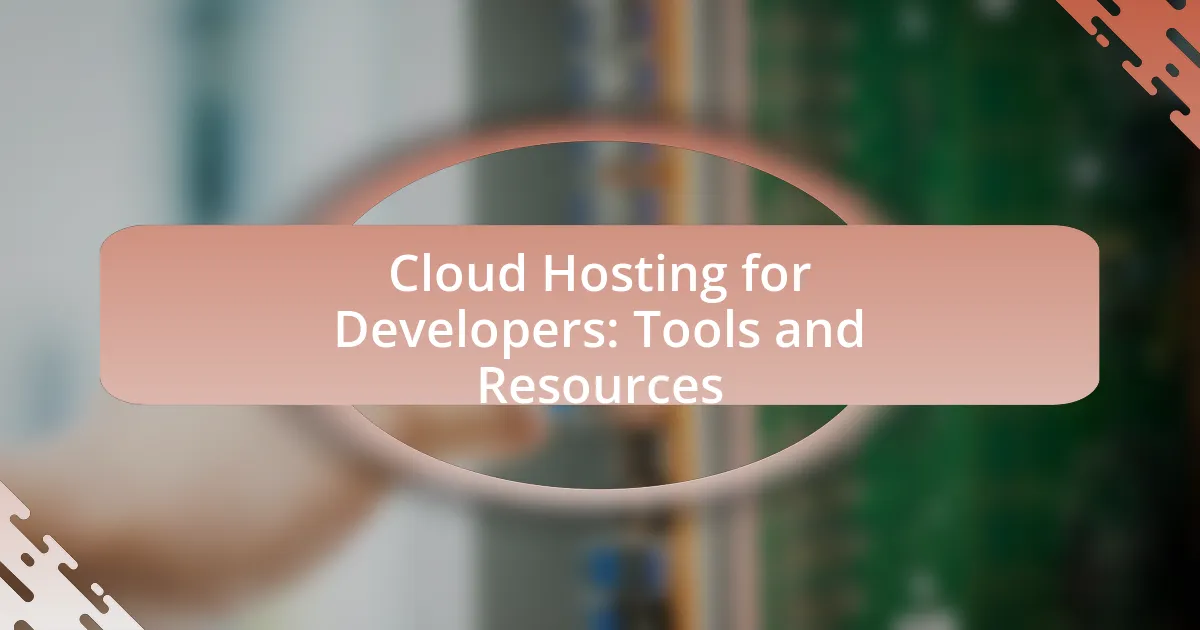Cloud hosting for developers is a scalable and flexible service that provides computing resources over the internet, enabling the deployment and management of applications without physical hardware. This article explores the differences between cloud hosting and traditional hosting, highlighting key features such as scalability, flexibility, reliability, and cost-effectiveness. It also examines various types of cloud hosting, including Infrastructure as a Service (IaaS), Platform as a Service (PaaS), and Software as a Service (SaaS), along with essential tools and resources for developers. Additionally, the article discusses best practices for security, performance optimization, and troubleshooting in cloud environments, providing a comprehensive overview of the tools and strategies that enhance cloud hosting experiences for developers.

What is Cloud Hosting for Developers?
Cloud hosting for developers is a service that provides scalable and flexible computing resources over the internet, allowing developers to deploy, manage, and scale applications without the need for physical hardware. This model utilizes virtual servers hosted in a cloud environment, enabling developers to access resources on-demand and pay only for what they use. According to a report by Gartner, cloud hosting can reduce infrastructure costs by up to 30%, making it an efficient choice for development projects.
How does Cloud Hosting differ from traditional hosting?
Cloud hosting differs from traditional hosting primarily in its resource allocation and scalability. In cloud hosting, resources are distributed across multiple servers, allowing for on-demand scaling and flexibility, whereas traditional hosting typically relies on a single server with fixed resources. This means that cloud hosting can handle traffic spikes more efficiently and offers better redundancy, as data is stored across various locations, reducing the risk of downtime. According to a report by Gartner, cloud services are expected to grow significantly, indicating a shift in preference towards cloud solutions due to their adaptability and cost-effectiveness compared to traditional hosting models.
What are the key features of Cloud Hosting?
Cloud hosting offers several key features, including scalability, flexibility, reliability, and cost-effectiveness. Scalability allows resources to be adjusted on-demand, accommodating varying workloads without downtime. Flexibility enables users to choose configurations that best suit their needs, including different operating systems and software. Reliability is achieved through data redundancy and backup systems across multiple servers, ensuring high availability. Cost-effectiveness is realized through a pay-as-you-go pricing model, which allows users to pay only for the resources they consume, reducing overall expenses. These features collectively enhance the performance and efficiency of applications hosted in the cloud.
Why is scalability important in Cloud Hosting?
Scalability is important in cloud hosting because it allows resources to be adjusted dynamically based on demand. This flexibility ensures that applications can handle varying workloads without performance degradation. For instance, during peak usage times, cloud hosting can automatically allocate additional resources, which helps maintain optimal performance and user experience. According to a study by Gartner, organizations that leverage scalable cloud solutions can reduce infrastructure costs by up to 30% while improving service availability. This demonstrates that scalability not only enhances operational efficiency but also supports business growth by accommodating fluctuating user needs effectively.
What types of Cloud Hosting are available for developers?
There are several types of cloud hosting available for developers, including Infrastructure as a Service (IaaS), Platform as a Service (PaaS), Software as a Service (SaaS), and Function as a Service (FaaS). IaaS provides virtualized computing resources over the internet, allowing developers to manage servers and storage. PaaS offers a platform allowing developers to build, deploy, and manage applications without dealing with the underlying infrastructure. SaaS delivers software applications over the internet on a subscription basis, enabling developers to access applications without installation. FaaS allows developers to execute code in response to events without managing servers, promoting a serverless architecture. Each type caters to different development needs, enhancing flexibility and scalability in cloud environments.
What is Infrastructure as a Service (IaaS)?
Infrastructure as a Service (IaaS) is a cloud computing model that provides virtualized computing resources over the internet. In this model, users can rent IT infrastructure such as servers, storage, and networking on a pay-as-you-go basis, allowing for scalability and flexibility. According to a report by Gartner, the IaaS market is expected to grow significantly, indicating its increasing adoption among businesses seeking cost-effective and efficient IT solutions.
How does Platform as a Service (PaaS) benefit developers?
Platform as a Service (PaaS) benefits developers by providing a streamlined environment for application development, which reduces the complexity of managing infrastructure. This allows developers to focus on coding and deploying applications without worrying about hardware, operating systems, or middleware. PaaS platforms often include built-in tools for collaboration, testing, and deployment, which enhance productivity. For instance, according to a report by Gartner, PaaS can accelerate application development by up to 30% due to its automated processes and integrated development environments.
What is Software as a Service (SaaS) and its relevance?
Software as a Service (SaaS) is a cloud-based software delivery model where applications are hosted on a remote server and accessed via the internet, rather than being installed on local devices. SaaS is relevant because it offers scalability, cost-effectiveness, and ease of access, allowing developers to utilize software without the need for extensive infrastructure or maintenance. According to a report by Gartner, the global SaaS market is projected to reach $143 billion by 2022, highlighting its growing importance in the software industry.
What are the primary use cases for Cloud Hosting among developers?
The primary use cases for Cloud Hosting among developers include application development and testing, website hosting, data storage and backup, and scalable infrastructure management. Developers utilize cloud hosting to create, test, and deploy applications in a flexible environment that allows for rapid iteration and collaboration. For instance, platforms like AWS and Azure provide tools that enable developers to host websites with high availability and performance. Additionally, cloud hosting offers reliable data storage solutions, allowing developers to back up and manage large datasets efficiently. The scalability of cloud infrastructure supports developers in adjusting resources based on demand, which is crucial for handling varying workloads and optimizing costs.
How do developers utilize Cloud Hosting for web applications?
Developers utilize Cloud Hosting for web applications by leveraging scalable resources, enabling rapid deployment, and ensuring high availability. Cloud Hosting allows developers to provision virtual servers and storage on-demand, which supports the dynamic scaling of applications based on user traffic. For instance, platforms like Amazon Web Services (AWS) and Microsoft Azure provide tools such as auto-scaling and load balancing, which automatically adjust resources to meet application demands. This flexibility enhances performance and reduces downtime, as cloud providers often guarantee uptime percentages exceeding 99.9%. Additionally, developers benefit from integrated services like databases, content delivery networks, and security features, streamlining the development process and improving application resilience.
What role does Cloud Hosting play in mobile app development?
Cloud Hosting plays a critical role in mobile app development by providing scalable resources and infrastructure that support app performance and availability. It enables developers to deploy applications quickly, manage data storage efficiently, and ensure seamless updates and maintenance. According to a report by Gartner, 70% of organizations are expected to adopt cloud services by 2025, highlighting the growing reliance on cloud solutions for development needs. This scalability allows developers to handle varying user loads without investing in physical hardware, thus optimizing costs and enhancing user experience.

What tools are essential for Cloud Hosting?
Essential tools for cloud hosting include cloud management platforms, virtualization software, and monitoring tools. Cloud management platforms like AWS Management Console and Google Cloud Console facilitate resource allocation and management. Virtualization software such as VMware and Hyper-V enables the creation of virtual machines, optimizing resource usage. Monitoring tools like Prometheus and Grafana provide real-time insights into system performance and resource utilization, ensuring efficient operation. These tools collectively enhance the functionality, scalability, and reliability of cloud hosting environments.
Which cloud service providers are most popular among developers?
Amazon Web Services (AWS), Microsoft Azure, and Google Cloud Platform (GCP) are the most popular cloud service providers among developers. AWS leads the market with a significant share of 32% as of 2023, offering a wide range of services and tools that cater to various development needs. Microsoft Azure follows with approximately 20% market share, providing strong integration with Microsoft products, which is appealing to many developers. GCP, holding around 9% of the market, is favored for its data analytics and machine learning capabilities. These statistics reflect the preferences of developers based on service offerings, ease of use, and integration capabilities.
What are the advantages of using Amazon Web Services (AWS)?
Amazon Web Services (AWS) offers several advantages, including scalability, cost-effectiveness, and a comprehensive suite of services. Scalability allows developers to easily adjust resources based on demand, ensuring optimal performance without over-provisioning. Cost-effectiveness is achieved through a pay-as-you-go pricing model, which enables businesses to only pay for the resources they use, reducing unnecessary expenses. Additionally, AWS provides a wide range of services, from computing power to storage solutions, which facilitates the development and deployment of applications in a flexible environment. These advantages are supported by AWS’s extensive global infrastructure, which includes data centers in multiple regions, ensuring high availability and low latency for users worldwide.
How does Google Cloud Platform (GCP) cater to developers?
Google Cloud Platform (GCP) caters to developers by providing a comprehensive suite of tools and services designed to streamline application development and deployment. GCP offers services such as Google Kubernetes Engine for container orchestration, Cloud Functions for serverless computing, and Cloud Run for deploying applications in a fully managed environment. Additionally, GCP supports multiple programming languages and frameworks, enabling developers to use familiar tools. The platform also includes robust APIs, extensive documentation, and a vibrant community, which facilitate collaboration and knowledge sharing among developers. These features collectively enhance productivity and efficiency in the development process.
What unique features does Microsoft Azure offer?
Microsoft Azure offers unique features such as hybrid cloud capabilities, extensive compliance certifications, and a wide range of integrated development tools. Hybrid cloud capabilities allow seamless integration between on-premises and cloud environments, enabling businesses to maintain flexibility and control over their data. Azure’s extensive compliance certifications, including ISO 27001 and HIPAA, ensure that organizations can meet regulatory requirements while leveraging cloud services. Additionally, Azure provides integrated development tools like Azure DevOps and Visual Studio, which streamline the development process and enhance collaboration among teams. These features collectively position Azure as a robust platform for developers seeking comprehensive cloud hosting solutions.
What development tools enhance Cloud Hosting experiences?
Development tools that enhance Cloud Hosting experiences include containerization platforms like Docker, orchestration tools such as Kubernetes, and Infrastructure as Code (IaC) tools like Terraform. Docker allows developers to package applications and their dependencies into containers, ensuring consistency across different environments. Kubernetes automates the deployment, scaling, and management of containerized applications, improving resource utilization and operational efficiency. Terraform enables the management of cloud infrastructure through code, facilitating version control and reproducibility. These tools collectively streamline development workflows, enhance scalability, and improve deployment processes in cloud environments.
How do containerization tools like Docker improve deployment?
Containerization tools like Docker improve deployment by enabling consistent and reproducible environments across different stages of development and production. Docker encapsulates applications and their dependencies into containers, ensuring that they run the same way regardless of the underlying infrastructure. This consistency reduces the “it works on my machine” problem, streamlining the deployment process. Additionally, Docker allows for rapid scaling and resource efficiency, as multiple containers can run on a single host without conflicts. According to a 2021 survey by the Cloud Native Computing Foundation, 78% of organizations reported improved deployment speed and reliability after adopting containerization technologies like Docker.
What role do orchestration tools like Kubernetes play?
Orchestration tools like Kubernetes manage containerized applications across a cluster of machines, automating deployment, scaling, and operations. Kubernetes enables developers to efficiently manage application lifecycles by providing features such as load balancing, service discovery, and automated rollouts and rollbacks. According to the Cloud Native Computing Foundation, Kubernetes has become the de facto standard for container orchestration, with over 80% of organizations using it in production environments, demonstrating its critical role in modern cloud hosting for developers.
What monitoring and management tools are available for Cloud Hosting?
Monitoring and management tools available for Cloud Hosting include Amazon CloudWatch, Google Cloud Operations Suite, Microsoft Azure Monitor, and Datadog. These tools provide comprehensive monitoring capabilities, allowing users to track performance metrics, set alarms, and visualize data in real-time. For instance, Amazon CloudWatch enables users to collect and monitor log files and set alarms based on specific thresholds, while Google Cloud Operations Suite integrates monitoring, logging, and diagnostics into a single platform. Microsoft Azure Monitor offers insights into application performance and resource utilization, and Datadog provides a unified view of cloud infrastructure and application performance metrics. Each of these tools is widely used in the industry, demonstrating their effectiveness in managing cloud environments.
How can developers use logging tools for better insights?
Developers can use logging tools to gain better insights by systematically capturing and analyzing application behavior and performance metrics. By implementing structured logging, developers can record detailed information about events, errors, and user interactions, which facilitates troubleshooting and performance optimization. For instance, tools like ELK Stack (Elasticsearch, Logstash, Kibana) allow developers to visualize log data, making it easier to identify patterns and anomalies. Additionally, logging frameworks such as Log4j or Winston enable developers to configure log levels and formats, ensuring that relevant data is captured without overwhelming the system. This approach not only enhances debugging efficiency but also supports proactive monitoring, leading to improved application reliability and user experience.
What are the benefits of using performance monitoring tools?
Performance monitoring tools provide critical insights into application performance, enabling developers to identify and resolve issues proactively. These tools enhance system reliability by tracking metrics such as response times, error rates, and resource utilization, which helps in optimizing performance and ensuring a seamless user experience. According to a study by New Relic, organizations that implement performance monitoring can reduce downtime by up to 50%, demonstrating the tangible benefits of these tools in maintaining operational efficiency.

What resources can developers leverage for Cloud Hosting?
Developers can leverage various resources for cloud hosting, including cloud service providers, development frameworks, and management tools. Major cloud service providers such as Amazon Web Services (AWS), Microsoft Azure, and Google Cloud Platform offer extensive documentation, APIs, and SDKs that facilitate cloud hosting. Additionally, frameworks like Docker and Kubernetes enable developers to deploy and manage applications in cloud environments efficiently. Management tools such as Terraform and Ansible provide infrastructure as code capabilities, allowing for automated provisioning and configuration of cloud resources. These resources collectively enhance the development process and streamline cloud hosting operations.
What online communities and forums are beneficial for developers?
Online communities and forums that are beneficial for developers include Stack Overflow, GitHub, Reddit, and Dev.to. Stack Overflow is a question-and-answer platform where developers can seek help on specific coding issues, with over 50 million monthly visitors, making it a vital resource for troubleshooting and knowledge sharing. GitHub serves as a collaborative platform for version control and code sharing, hosting millions of repositories that facilitate community contributions and project collaboration. Reddit features various subreddits like r/programming and r/webdev, where developers discuss trends, share resources, and seek advice, fostering a sense of community among users. Dev.to is a platform specifically designed for developers to share articles, tutorials, and insights, with a focus on creating a welcoming environment for learning and networking. These platforms collectively enhance developers’ skills, provide support, and promote collaboration within the tech community.
How can platforms like Stack Overflow assist developers?
Platforms like Stack Overflow assist developers by providing a vast repository of community-driven knowledge and solutions to programming-related questions. Developers can post specific queries and receive answers from experienced peers, which accelerates problem-solving and enhances learning. According to a 2021 Stack Overflow Developer Survey, 90% of developers reported using Stack Overflow to find solutions to coding issues, highlighting its effectiveness as a resource. Additionally, the platform fosters collaboration and networking among developers, allowing them to share insights and best practices, which is crucial in the rapidly evolving field of technology.
What role do GitHub and GitLab play in collaborative development?
GitHub and GitLab serve as essential platforms for collaborative development by providing version control, issue tracking, and project management tools. These platforms enable multiple developers to work on the same codebase simultaneously, facilitating seamless collaboration through features like pull requests and merge requests, which allow for code review and integration. GitHub, with over 40 million users, and GitLab, with a strong focus on DevOps, both support continuous integration and deployment, enhancing workflow efficiency. Their widespread adoption in the software development community underscores their critical role in fostering teamwork and improving code quality through collaborative practices.
What educational resources are available for learning about Cloud Hosting?
Educational resources for learning about Cloud Hosting include online courses, tutorials, and documentation from major cloud service providers. Platforms like Coursera, Udemy, and edX offer structured courses on cloud computing fundamentals and specific cloud services such as AWS, Azure, and Google Cloud. Additionally, the official documentation from providers like Amazon Web Services, Microsoft Azure, and Google Cloud Platform serves as comprehensive resources for understanding their services and best practices. These resources are widely recognized in the industry, ensuring that learners gain relevant and practical knowledge in cloud hosting.
Which online courses are recommended for Cloud Hosting skills?
Recommended online courses for Cloud Hosting skills include “AWS Certified Solutions Architect” on Coursera, “Google Cloud Platform Fundamentals” on Pluralsight, and “Microsoft Azure Fundamentals” on edX. These courses provide foundational knowledge and practical skills in cloud architecture and services. For instance, the AWS course covers essential concepts and best practices for deploying applications on Amazon Web Services, while the Google Cloud course introduces core services and tools for cloud computing. The Microsoft Azure course offers insights into Azure services and cloud solutions. Each course is designed to enhance understanding and proficiency in cloud hosting, making them valuable resources for developers.
What books provide in-depth knowledge on Cloud Hosting?
Books that provide in-depth knowledge on Cloud Hosting include “Cloud Computing: Concepts, Technology & Architecture” by Thomas Erl, which offers a comprehensive overview of cloud computing principles and architecture. Another significant resource is “Architecting the Cloud: Design Decisions for Cloud Computing Service Models” by Michael J. Kavis, which focuses on design decisions and best practices for cloud architecture. Additionally, “Cloud Native Patterns: Designing change-tolerant software” by Cornelia Davis explores cloud-native application design, emphasizing scalability and resilience. These books are recognized for their detailed insights and practical guidance in the field of cloud hosting.
What best practices should developers follow when using Cloud Hosting?
Developers should follow several best practices when using cloud hosting to ensure efficiency, security, and cost-effectiveness. First, they should implement a robust security strategy, including encryption, access controls, and regular security audits, as data breaches can cost companies an average of $3.86 million according to IBM’s Cost of a Data Breach Report 2020. Second, developers should utilize auto-scaling features to manage resources dynamically, which can optimize costs and performance based on demand. Third, they should adopt a multi-cloud strategy to avoid vendor lock-in and enhance redundancy, as 81% of enterprises use a multi-cloud strategy according to a 2021 Flexera report. Fourth, regular backups and disaster recovery plans are essential to prevent data loss, with 93% of companies that lost their data center for 10 days or more filed for bankruptcy within a year, as reported by the National Archives & Records Administration. Lastly, developers should monitor performance and costs continuously using cloud management tools to identify inefficiencies and optimize resource usage.
How can developers ensure security in Cloud Hosting environments?
Developers can ensure security in Cloud Hosting environments by implementing strong access controls, encryption, and regular security audits. Strong access controls, such as multi-factor authentication and role-based access, limit unauthorized access to sensitive data. Encryption protects data both at rest and in transit, making it unreadable to unauthorized users. Regular security audits help identify vulnerabilities and ensure compliance with security standards. According to a 2021 report by the Cloud Security Alliance, 94% of organizations experienced a cloud security incident, highlighting the importance of these measures in mitigating risks.
What strategies can optimize performance in Cloud Hosting?
To optimize performance in cloud hosting, implementing auto-scaling is essential, as it allows resources to adjust dynamically based on demand. This strategy ensures that applications maintain performance during traffic spikes while minimizing costs during low usage periods. Additionally, utilizing Content Delivery Networks (CDNs) can significantly enhance load times by caching content closer to users, reducing latency. According to a study by Akamai, using a CDN can improve website load times by up to 50%. Furthermore, optimizing server configurations and regularly monitoring performance metrics can identify bottlenecks and enhance resource allocation, leading to improved overall efficiency.
What common troubleshooting tips should developers know?
Common troubleshooting tips that developers should know include checking logs for error messages, verifying configurations, and isolating the problem by simplifying the environment. Checking logs helps identify specific issues, as they often contain detailed error messages that point to the root cause. Verifying configurations ensures that settings are correct and compatible with the system, which is crucial in cloud environments where multiple services interact. Isolating the problem by simplifying the environment, such as running components individually, can help pinpoint where the issue lies. These practices are widely recognized in software development and cloud hosting, as they streamline the debugging process and enhance efficiency.

